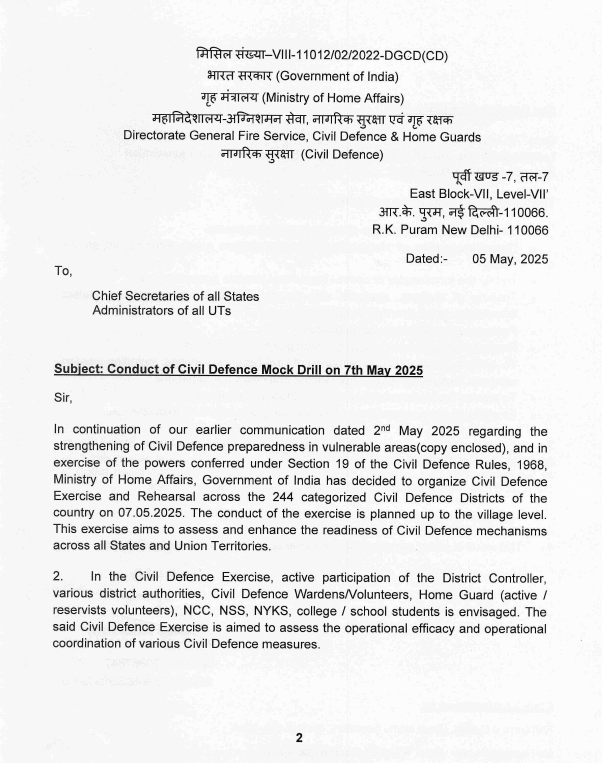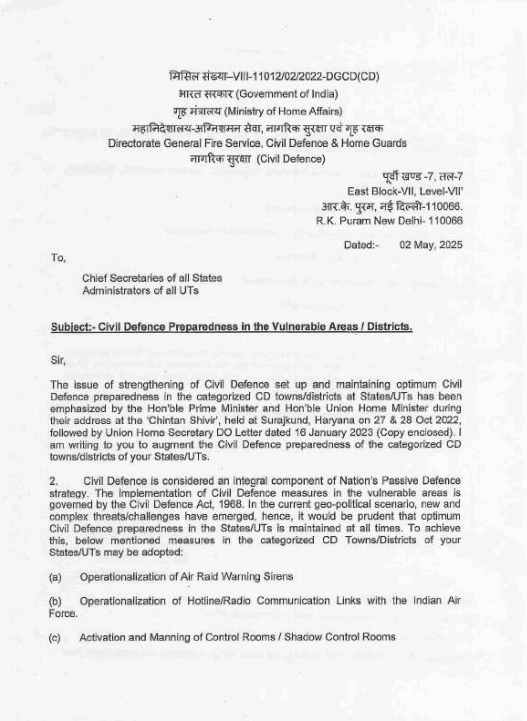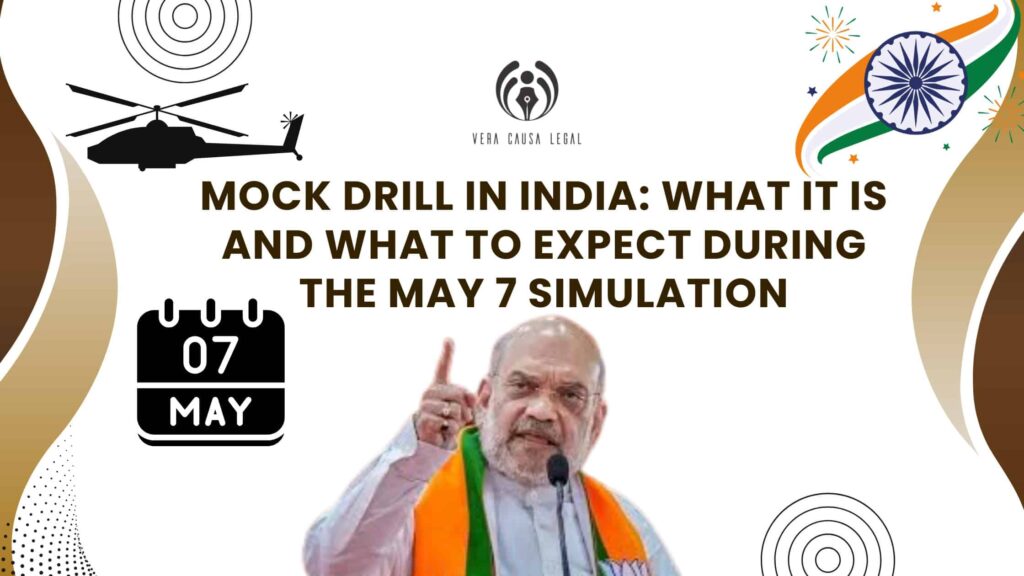In an era of rising global tensions, civil defence has reemerged as a vital aspect of national security. The upcoming mock drill in India on May 7, 2025, is one such significant step undertaken by the Ministry of Home Affairs (MHA) to assess and enhance emergency preparedness. This unprecedented drill, scheduled across 244 districts, is designed to simulate a war-like emergency — complete with blackout protocols, air raid sirens, evacuations, and civil defence mobilization.
As legal advisors and civic rights advocates, Vera Causa Legal aims to unpack what this mock drill in India entails, why it’s necessary, and what you — as a citizen or institution — should be ready for. We’ll also look at legal implications, rights and responsibilities under such exercises, and how to remain informed and compliant.
Official Government Documentation






What Is a Mock Drill in India?
A mock drill in India is a simulated emergency response exercise conducted by government agencies to test readiness for real-life crises. These could range from natural disasters and chemical leaks to terrorist attacks and — in this case — war-like situations.
The May 7 drill focuses on a civil defence scenario, invoking wartime responses such as blackouts, air raid protocols, and public evacuation drills. Its core objective is to ensure that citizens and institutions know how to act swiftly and safely during an actual emergency.
Why Is the May 7 Mock Drill in India Significant?
The mock drill in India on May 7 comes amidst heightened tensions between India and Pakistan, following recent terror attacks that have strained diplomatic relations. While the drill is not a precursor to war, it serves as a preventive and preparedness tool, reminding citizens that readiness saves lives.
Key features of the May 7 simulation include:
- Total blackout in designated urban zones
- Activation of sirens, emergency broadcasts, and public alerts
- Simulated evacuation of civilians from “high-risk” zones
- Coordination between district administrations, police, armed forces, and medical services
- Public advisories to avoid panic and misinformation
Government’s Role and Legal Backing
The mock drill in India is being implemented under the authority of the Disaster Management Act, 2005, and the Civil Defence Act, 1968. These laws empower the Centre and State governments to take preemptive action for civil safety.
Relevant Provisions:
- Civil Defence Act, 1968, Section 3: Authorizes civil defence measures during war or other hostile attacks.
- Disaster Management Act, 2005, Section 6: Enables the National Executive Committee to coordinate preparedness activities.
- Indian Telegraph Act, 1885: Authorizes the government to regulate communication during emergencies.
Hence, participation and cooperation during such drills are not just civic duties — they’re backed by law.
Legal Implications for Citizens and Institutions
During a mock drill in India, certain legal protocols come into effect that citizens and businesses must respect:
For Citizens:
- You may be temporarily restricted from leaving certain areas.
- Access to communication channels (mobile data, internet) may be disrupted.
- Identity verification may be required at checkpoints.
For Institutions:
- Offices may be asked to conduct emergency evacuation simulations.
- Hospitals and schools will need to follow standard operating procedures (SOPs) provided by the district administration.
- Industrial units dealing with hazardous materials may face mock containment protocols.
Penalties for Non-Compliance:
Under Section 51 of the Disaster Management Act, obstruction or non-compliance during such drills can lead to:
- Imprisonment up to 1 year
- Or a fine
- Or both
This makes it critical for every stakeholder to understand their roles and responsibilities.
What to Expect During the May 7 Mock Drill in India
If you’re residing in any of the 244 identified districts, here’s what you may witness or experience on May 7:
- Air Raid Sirens and Blackout
Residents will hear high-decibel air raid sirens — a signal to switch off all lights and remain indoors. In some urban centres, power may be cut off temporarily to simulate a blackout.
- Evacuation and Shelter Coordination
District authorities will conduct mock evacuations, guiding residents to underground or community shelters. These will be timed to assess efficiency.
- Emergency Broadcast System Activation
You may receive alerts via:
- Radio
- TV
- SMS
- Public loudspeakers
The purpose is to test the efficiency of India’s multi-layered alert systems.
- Police and Civil Defence Personnel Mobilization
Expect increased presence of:
- Civil defence volunteers
- Armed forces in non-combat gear
- Local police at key intersections
They will simulate perimeter security, roadblocks, and rescue ops.
Role of Legal Professionals and Institutions
Legal experts, including law firms like Vera Causa Legal, play a crucial role during such national-level exercises:
- Advisory Support
We provide legal advice to:
- Corporations on business continuity and compliance
- Hospitals on emergency SOPs
- Schools on child safety protocols
- Employee Rights & Employer Obligations
We help clarify:
- Whether employees can be asked to stay home or report to evacuation zones
- If salaries will be affected
- What to do in case of injuries during the drill
- Data Privacy and Surveillance
During a mock drill in India, governments may monitor mobile towers and surveillance feeds. We ensure businesses comply with privacy laws while supporting national interests.
Public Misconceptions and Misinformation
Given the current geopolitical climate, rumours surrounding the mock drill in India are widespread. Some common myths include:
- “It’s a signal that war is imminent”
➤ False. This is a precautionary drill, not a war alert. - “You can ignore it if it disrupts work or travel”
➤ False. Non-compliance during drills can lead to legal action. - “Your data will be stolen during the blackout”
➤ Untrue. Surveillance is monitored through legal mechanisms.
To avoid panic, citizens should rely only on official channels and verified legal updates.
How to Prepare for the Mock Drill in India
Here are steps you can take to prepare safely and responsibly:
Household Checklist:
- Keep flashlights and power banks ready
- Stock up on basic supplies: water, dry food, essential medicines
- Talk to children and elderly family members about what to expect
- Charge your phone and download government alert apps
Office Checklist:
- Assign safety officers
- Conduct evacuation mock drills in advance
- Update contact lists and emergency services directories
- Review insurance and liability clauses
Institutional Checklist:
- Hospitals should keep emergency response units activated
- Schools must train staff on child evacuation protocols
- Factories must secure hazardous machinery or materials
Constitutional & Human Rights Concerns
The mock drill in India may involve restrictions on movement, communication, and daily life. While these are temporary and legal during such simulations, they do raise important questions about civil liberties.
At Vera Causa Legal, we ensure:
- Constitutional safeguards are not violated
- Temporary restrictions do not become unjustified controls
- Emergency protocols adhere to human rights norms
We offer consultation to anyone who feels their rights were disproportionately restricted during the drill.
International Comparisons
India is not alone in conducting such civil defence exercises.
- South Korea runs national drills with missile warnings.
- Israel has regular siren-based evacuation tests.
- Japan prepares citizens for earthquakes and chemical attacks.
India’s May 7 mock drill brings us in line with global civil protection standards — especially as threats become more complex and unpredictable.
FAQs About the May 7 Mock Drill in India
Q1: Will all cities be part of the mock drill in India?
A: No, only selected 244 districts across various states are participating.
Q2: Is this drill compulsory?
A: Yes, for residents and institutions in the designated areas.
Q3: What should I do if I’m traveling on May 7?
A: Stay updated on your location’s inclusion in the drill and follow advisories.
Q4: Can I face legal consequences if I ignore it?
A: Yes, under the Disaster Management Act.
Q5: Will mobile networks be shut down?
A: Possibly in some zones for a short time, purely for testing emergency protocols.
Conclusion
The upcoming mock drill in India on May 7 is a landmark civil defence initiative that tests the nation’s emergency response systems. While not an actual threat, it brings forward vital questions about safety, law, order, and civil liberty. Preparedness is no longer optional — it’s a national duty.
Stay alert. Stay informed. And when in doubt, seek legal counsel.
📞 For emergency legal advice related to disaster compliance or civil defence protocols, reach out to Vera Causa Legal

